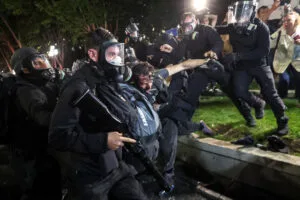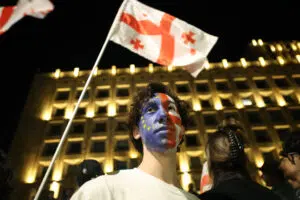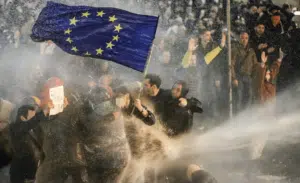Brussels – The confrontation in Georgia is no longer just political or even just peaceful. Police have started using violence against peaceful protesters to try to break up the mass street protests, which have been daily for almost a month, in Tbilisi against the pro-Russian-inspired transparency of foreign influence bill. After the criticisms from all EU institutions, at every level, against the ruling Georgian Dream party’s trademark, even the European Commission’s number one, Ursula von der Leyen, has come out unequivocally: “I am following the situation in Georgia with great concern and I condemn the violence in the streets of Tbilisi,” she said in a statement, urging the government to heed the “clear message” of the citizens who are “demonstrating their strong attachment to democracy.”

Sparking tensions in Tbilisi and Brussels is the controversial draft law on ‘transparency of foreign influence’ wanted as early as last year by the ruling Georgian Dream party and stalled after the mass wave of protests of March 2023. With a slight amendment to the text in early April, the government resubmitted the law: all organizations that receive more than 20 percent of their funding from abroad would have to register as an ‘organization pursuing the interests of a foreign power’ (similar to ‘agent of foreign influence’ in effect in Russia since Dec. 1, 2022). For weeks, tensions have been extremely high inside and outside the Tbilisi parliament, where the draft had already been approved in the first and second readings. The final vote is on May 17. No surprises are expected from Georgian lawmakers, but another wave of tension will be inevitable. The draft law will be sent to the President of the Republic, Salomé Nino Zourabichvili, who has already announced that she will veto it, but Georgian Dream will be able to use its overwhelming majority in Parliament to override the veto and make the ‘transparency of foreign influence’ bill become law.

For days, tens of thousands of citizens have attended spontaneous demonstrations organized by united oppositions and civil society organizations to reiterate opposition to draft legislation that would undermine Georgia’s path to membership in the European Union, despite the Candidate country status received on December 14, 2023, from the European Council. “The European Union has also clearly expressed its concerns regarding the law on foreign influence,” von der Leyen noted, warning in a not-so-veiled manner, “Georgia is at a crossroads. It should stay the course on the road to Europe.” And if the Georgian people “want a European future for their country,” the government of Irakli Kobakhidze will have to “take swift action on the measures they have committed to take as a candidate country.” By now, it is no secret in Brussels that the entry into force of the pro-Russian-inspired law would prevent the opening of EU accession negotiations. “If our partners are able to read and understand carefully, they will be able to recognize the message sent publicly and directly,” European External Action Service (EEAS) spokesman Peter Stano explained to the press today (May 2).
The concern now, however, is how Georgian institutions are responding to tens of thousands of people who show no signs of fatigue in taking to the streets every day to demonstrate their opposition to the pro-Russian bill. Particularly after the bill passed its second reading with 83 votes in favor and 23 against in Parliament on Tuesday (April 30). On the same evening, for the first time since March 2023, riot police disrupted peaceful protests on Rustaveli Avenue (where Parliament is located) using tear gas, pepper spray, and water cannons, truncheoning and arresting more than 60 people. “Georgia is an EU candidate country. I call on its authorities to ensure the right to peaceful assembly. Use of force to suppress it is unacceptable,” High Representative for Foreign Affairs and Security Policy Josep Borrell said.
The complex relationship between the EU and Georgia
Despite being granted candidate status for EU membership, the relationship between Brussels and Tbilisi remains particularly complex due to the distance between an overwhelmingly pro-EU population and a government with pro-Russian tendencies, the same one that applied to join the Union due to fears raised by Kremlin expansionism. Over the past two years, several episodes have highlighted the ambiguity of the ruling Georgian Dream party .In May 2023, flights between Georgia and Russia resumed after Moscow decided to lift the current ban, and the Caucasian country never aligned with restrictive measures introduced by Brussels against the Kremlin after Russia invaded Ukraine. Last fall, the government tried to impeach (but failed) the President of the Republic Zourabichvili for a series of trips to the European Union that allegedly constituted a violation of the powers of the head of state under the national Constitution.

But the Georgian population has for years shown that it does not share the direction taken by Georgian Dream, the reason for which the October 26 elections for the renewal of Parliament will be crucial. Around when Brussels decided not to grant candidate status yet to Georgia, in June 2022, two major pro-EU demonstrations took place in Tbilisi: one March for Europe to reiterate the people’s alignment with the values of the Union and a town hall calling for government’s resignation (with no follow-up by the then Garibashvili-led executive). The common features highlighted from these demonstrations are the flags – white and red of the five crosses (national) and with the twelve stars on a blue field (of the EU) – signs with pro-European claims and the Georgian anthem interspersed with the Ode to Joy. A year later, harsh mass protests broke out in March 2023 – supported by Brussels – which stalled the controversial bill on ‘transparency of foreign influence’ at least until the events of this spring.
In this scenario, one should not forget Georgia’s delicate relationship with Russia, a country with which it borders to the north. Its candidacy for EU and NATO membership – enshrined in its national constitution – has long been a cause of tension with the Kremlin. After conflicts in the 1990s with the two separatist regions of South Ossetia (1991-1992) and Abkhazia (1991-1993), following Georgia’s 1991 independence from the Soviet Union, the situation on the ground was effectively frozen for 15 years, with troops of the newly formed Russian Federation defending the secessionists within the claimed territory. The attempt to reassert Tbilisi’s control over the two regions in the summer of 2008 – launched by then-President Mikheil Saakashvili – led to a violent Russian reaction on August 7, not only in repelling the Georgian army’s offensive but also leading to the invasion of the rest of the national territory with tanks and air raids for five days. Since then, Vladimir Putin‘s Russia has recognized the independence of Abkhazia and South Ossetia and has deployed thousands of soldiers to the two territories to increase its sphere of influence in the Ciscaucasia region, in violation of the August 12, 2008 agreements.
English version by the Translation Service of Withub








